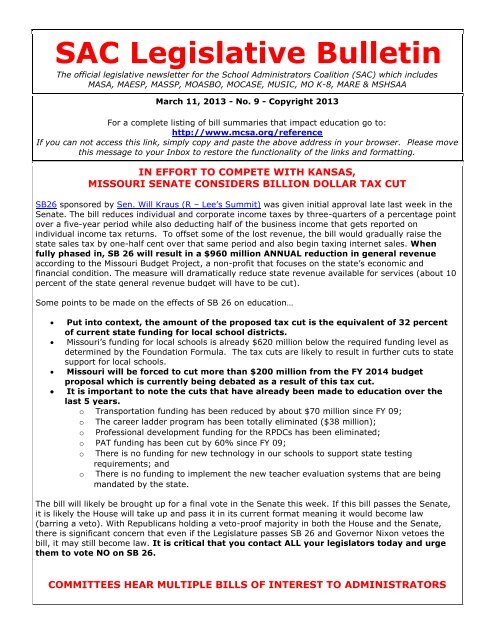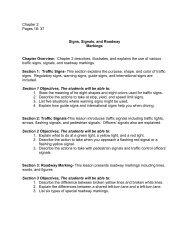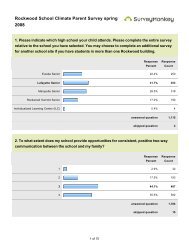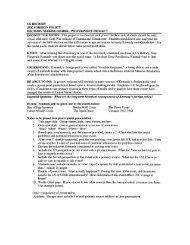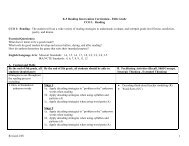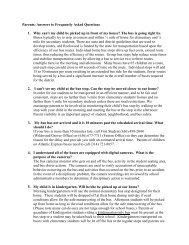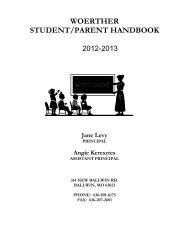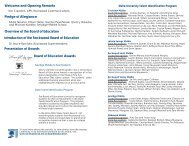SAC Legislative Bulletin 09.pdf - Rockwood School District
SAC Legislative Bulletin 09.pdf - Rockwood School District
SAC Legislative Bulletin 09.pdf - Rockwood School District
Create successful ePaper yourself
Turn your PDF publications into a flip-book with our unique Google optimized e-Paper software.
<strong>SAC</strong> <strong>Legislative</strong> <strong>Bulletin</strong><br />
The official legislative newsletter for the <strong>School</strong> Administrators Coalition (<strong>SAC</strong>) which includes<br />
MASA, MAESP, MASSP, MOASBO, MOCASE, MUSIC, MO K-8, MARE & MSHSAA<br />
March 11, 2013 - No. 9 - Copyright 2013<br />
For a complete listing of bill summaries that impact education go to:<br />
http://www.mcsa.org/reference<br />
If you can not access this link, simply copy and paste the above address in your browser. Please move<br />
this message to your Inbox to restore the functionality of the links and formatting.<br />
IN EFFORT TO COMPETE WITH KANSAS,<br />
MISSOURI SENATE CONSIDERS BILLION DOLLAR TAX CUT<br />
SB26 sponsored by Sen. Will Kraus (R – Lee’s Summit) was given initial approval late last week in the<br />
Senate. The bill reduces individual and corporate income taxes by three-quarters of a percentage point<br />
over a five-year period while also deducting half of the business income that gets reported on<br />
individual income tax returns. To offset some of the lost revenue, the bill would gradually raise the<br />
state sales tax by one-half cent over that same period and also begin taxing internet sales. When<br />
fully phased in, SB 26 will result in a $960 million ANNUAL reduction in general revenue<br />
according to the Missouri Budget Project, a non-profit that focuses on the state’s economic and<br />
financial condition. The measure will dramatically reduce state revenue available for services (about 10<br />
percent of the state general revenue budget will have to be cut).<br />
Some points to be made on the effects of SB 26 on education…<br />
<br />
<br />
<br />
<br />
Put into context, the amount of the proposed tax cut is the equivalent of 32 percent<br />
of current state funding for local school districts.<br />
Missouri’s funding for local schools is already $620 million below the required funding level as<br />
determined by the Foundation Formula. The tax cuts are likely to result in further cuts to state<br />
support for local schools.<br />
Missouri will be forced to cut more than $200 million from the FY 2014 budget<br />
proposal which is currently being debated as a result of this tax cut.<br />
It is important to note the cuts that have already been made to education over the<br />
last 5 years.<br />
o Transportation funding has been reduced by about $70 million since FY 09;<br />
o The career ladder program has been totally eliminated ($38 million);<br />
o Professional development funding for the RPDCs has been eliminated;<br />
o PAT funding has been cut by 60% since FY 09;<br />
o There is no funding for new technology in our schools to support state testing<br />
requirements; and<br />
o There is no funding to implement the new teacher evaluation systems that are being<br />
mandated by the state.<br />
The bill will likely be brought up for a final vote in the Senate this week. If this bill passes the Senate,<br />
it is likely the House will take up and pass it in its current format meaning it would become law<br />
(barring a veto). With Republicans holding a veto-proof majority in both the House and the Senate,<br />
there is significant concern that even if the Legislature passes SB 26 and Governor Nixon vetoes the<br />
bill, it may still become law. It is critical that you contact ALL your legislators today and urge<br />
them to vote NO on SB 26.<br />
COMMITTEES HEAR MULTIPLE BILLS OF INTEREST TO ADMINISTRATORS
Common Core<br />
Last week, the House and Senate Education Committees heard multiple bills that <strong>SAC</strong> is watching<br />
closely this year. First SB 210, sponsored by Sen. John Lamping (R – Ladue), was heard in the Senate.<br />
SB 210 would prevent the State Board of Education from implementing the Common Core State<br />
Standards and require all future curriculum standards to be approved by the state legislature. Bills like<br />
this are being pursued in state capitols across the country over fears that Common Core is a national<br />
curriculum developed by President Obama that removes all local control from education. Opponents,<br />
which include <strong>SAC</strong>, focus on the wasted time and effort SB 210 would represent considering the<br />
millions of dollars and countless hours of professional development that have been put into<br />
implementing Common Core.<br />
An identical bill in the House (HB 616) was heard in the Downsizing Government Committee last week<br />
as well.<br />
Special Needs Vouchers<br />
Last week, the House Education Committee heard a very familiar bill when it heard HB 458, also known<br />
as Bryce’s Law. The bill, sponsored by Rep. Dwight Scharnhorst (R – Valley Park), would create a<br />
tuition tax credit for donors that give up to $800,000 to not-for-profit companies that hand out<br />
education vouchers so students can attend private schools. <strong>SAC</strong> is opposed to this bill for multiple<br />
reasons.<br />
- Contrary to the current movement on tax credits in the legislature, HB 458 does not put a cap<br />
on the amount the program would cost the state.<br />
- There is no regulation of private schools (like the requirement to employ highly trained<br />
teachers) despite those schools receiving the equivalent of state dollars.<br />
- Students would no longer have the protections of IDEA, Section 504, or the Americans with<br />
Disabilities Act.<br />
- Local districts under federal law are still required to be responsible for special needs students.<br />
HB 458 would create situations where districts would still need to provide and be responsible for<br />
services (like transportation) despite not having any control over the educational experience for<br />
the student.<br />
- HB 458 represents a foot in the door for an expanded, state-wide voucher program that will<br />
draw millions more away from our already underfunded public school system.<br />
Virtual Charter <strong>School</strong> Open Enrollment<br />
Also last week, the House Education Committee heard HB 470, sponsored by Rep. Jay Barnes, which<br />
would allow any student to enroll in a virtual charter school. While charter schools are currently limited<br />
to St. Louis, Kansas City and any unaccredited school district, HB 470 would allow students from<br />
across the state to enroll in a virtual charter school.<br />
The key to this bill is what it will do to the state foundation formula. Charter schools currently receive<br />
state aid payments equivalent to their local district’s state formula payment. It is expected that if HB<br />
470 becomes law, the majority of students that would enroll in these virtual charter schools are<br />
students that are currently home schooled. This means the net effect of HB 470 is that it allows home<br />
schooled students to receive state aid payments and further reduces the funds available for our<br />
foundation formula payments to public schools.<br />
<strong>SAC</strong> supports the expansion of virtual education in Missouri. The state legislature has nearly eliminated<br />
funding for the Missouri Virtual Instruction Program over the last few years leaving districts and home<br />
school students with little access to virtual education services unless the district provides the services<br />
themselves. <strong>SAC</strong> sees HB 470 as a way for the legislature to steal money from the foundation formula<br />
because they have not funded Missouri’s virtual program.<br />
According to our records, the following individuals represent
at least a portion of your school district:<br />
Senator(s)<br />
Scott Rupp (R) Phone: 573-751-1282<br />
Eric Schmitt (R) Phone: 573-751-2853<br />
Ryan McKenna (D) Phone: 573-751-1492<br />
Tom Dempsey (R) Phone: 573-751-1141<br />
Representative(s)<br />
Bill Otto (D) Phone: 573-751-4163<br />
Mike Leara (R) Phone: 573-751-2150<br />
John C McCaherty (R) Phone: 573-751-3751<br />
Dwight Scharnhorst (R) Phone: 573-751-4392<br />
Andrew Koenig (R) Phone: 573-751-5568<br />
Sue Allen (R) Phone: 573-751-9765<br />
Don Gosen (R) Phone: 573-751-1247<br />
Kurt Bahr (R) Phone: 573-751-9768<br />
Paul Curtman (R) Phone: 3776573-751-<br />
Timothy W Jones (R) Phone: 573-751-0562<br />
Michael Frame (D) Phone: 573-751-4567


